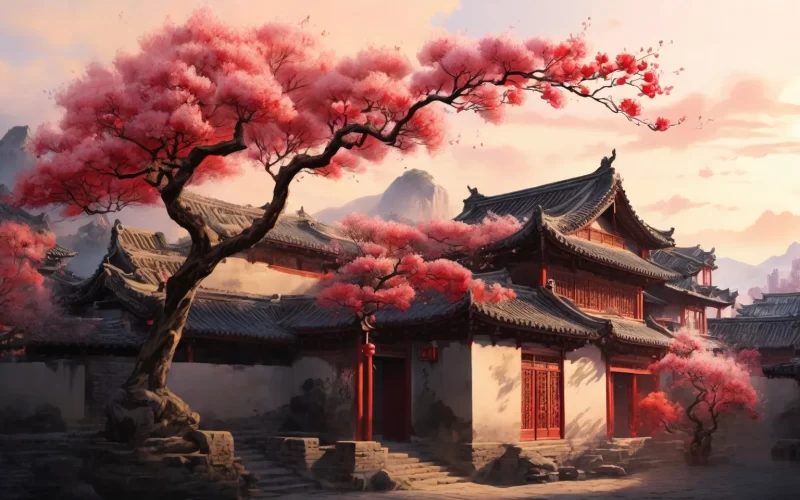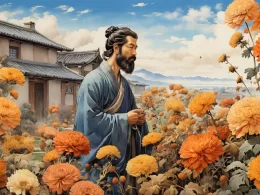When red berries grow in springtime,
Flushing the branches of the southern land,
Gather a handful, I pray you, for my sake —
They are the truest token of longing.
Original Poem
「相思」
王维
红豆生南国,春来发几枝。
愿君多采撷,此物最相思。
Interpretation
"One-Hearted" is one of Wang Wei's most renowned and widely circulated five-character quatrains, composed during the Tianbao era, a time when the High Tang's splendid aura still lingered yet signs of impending change filled the air. While ostensibly a delicate lyric piece that uses an object to convey sentiment, the poem embodies the distinct emotional aesthetic and consciousness of time and space characteristic of High Tang literati. Taking the "red bean"—a minute image saturated with cultural memory and life metaphor—as its core, the poet constructs, within the compact space of twenty characters, an enduring poetic field where emotion and imagery, time and space, exhortation and self-reflection fuse indistinguishably, transforming it into a classic symbol of longing within Chinese culture.
First Couplet: 红豆生南国,春来发几枝。
Hóngdòu shēng nánguó, chūn lái fā jǐ zhī.
Red beans grow in the southern land;
Come spring, how many new branches sprout, I wonder?
The opening is plain as speech yet subtly profound. "Red beans grow in the southern land" establishes a static spatial orientation, binding a specific plant (red beans) to a vast region (the south), thereby imbuing the image with geographical depth and cultural nostalgia. "Come spring, how many new branches sprout, I wonder?" gently introduces the dimension of time and the stirring of life through a musing question. The query "how many" is natural yet also a projection of emotion—what the poet ponders is not merely the plant, but the distant person's yearly condition and whether their affection, like spring growth, continues to flourish. One line static, the other dynamic; one concrete, the other suggestive. Through simple narration, they accomplish the poetic grounding in time and space.
Second Couplet: 愿君多采撷,此物最相思。
Yuàn jūn duō cǎi xié, cǐ wù zuì xiāngsī.
May you gather them in great number, I pray;
For of all things, this most embodies tender longing.
This couplet shifts from objective description to subjective entreaty, where emotion wells up powerfully yet remains restrained. "May you gather them in great number" is a heartfelt appeal across space; the word "many" is earnest, expressing a prolonged wish for the other to remember often and cherish this bond. "For of all things, this most embodies tender longing" is the ultimate revelation of the red bean's symbolic meaning and the highest affirmation of its emotional value. The word "most" is definitive, elevating the red bean from among myriad plants to the supreme symbol and unparalleled vessel of affection. This exhortation, seemingly directed outward (to "you"), truly points inward (to "my" own remembrance). The act of "gathering" is both the other's action and a metaphor for the poet himself repeatedly collecting and cherishing past affection within memory.
Holistic Appreciation
This is a poem of remarkable density, bearing profound feeling within an extremely compact form. Its structure is exquisite, presenting a seamless progression of "object—time—person—feeling": the first line establishes the object and place (red beans, southern land); the second introduces time and change (spring comes, branches sprout); the third turns to the person and action (I hope you, gather); the final line clarifies the feeling and its essence (most embodies longing). The four lines resemble a simple album leaf: in the foreground, a few branches of red beans; in the background, the distant southern land; beyond the frame, the poet's earnest gaze and silent entreaty.
Wang Wei's mastery in this poem lies in avoiding any overt sorrow or sentimental tone, instead distilling, cooling, and crystallizing intense emotion into the clean, vivid image of the "red bean." Longing is no longer a vague feeling but a visible, tangible, gather-able object. Simultaneously, the poem contains dual temporalities: nature's cyclical time (spring's return, branches sprouting) and emotion's cumulative, linear time. The poet skillfully infuses linear emotion into cyclical nature, granting personal longing a quality as eternal and natural as the changing seasons. The "you" in the poem can be a specific friend (such as Li Guinian) or an abstract confidant or reader. This openness allows the poem to transcend its specific occasion, becoming a vessel for universal emotion.
Artistic Features
- Cultural Symbolism and Emotional Encoding: Within the poem, the red bean is elevated beyond a simple plant to become a potent symbol, rich with cultural and emotional meaning. By linking it to a specific locale ("the southern land") and bestowing upon it a definitive emotional value ("most embodies tender longing"), Wang Wei fully activates this symbol. This act effectively etches the red bean into the cultural consciousness as the preeminent image for expressing remembrance and affection for generations to come.
- Nuance in Expression: Wondering Question and Heartfelt Entreaty: The opening query, "How many new branches sprout…?", employs a tone of gentle reflection rather than mere description. This rhetorical technique invites the reader into a shared space of contemplation, creating poetic resonance and opening a vast field for imagination. In contrast, the direct appeal, "May you gather them in great number…", expresses a wish with intimate sincerity. The combination of these modes—the indirect, reflective question and the direct, personal plea—generates a subtle yet powerful emotional tension, balancing wistfulness with deep-seated earnestness.
- Linguistic Purity and Symbolic Density: The poem achieves remarkable depth through extreme verbal economy. It utilizes no obscure vocabulary or ornate phrasing, maintaining the clarity of spoken language. Yet, each word—"red beans," "southern land," "spring," "gather," "longing"—functions as a highly concentrated, resonant unit of meaning. In their simple, deliberate combination, these words release immense emotional and associative power, proving that profundity need not rely on complexity.
- The Reflective "Mirror" Structure of Emotion: The poem's emotional logic operates through a sophisticated, indirect structure. The poet ostensibly expresses a wish directed outward ("I hope you will gather them"). However, the implied scene of the distant friend gathering beans and remembering someone is, in truth, a mirror image of the poet's own act of recollection and yearning. This technique of conveying deep personal feeling by ostensibly focusing on the other avoids straightforward declaration, making the emotion more nuanced and intensifying its impact through reflection and implication.
Insights
This work is like a cultural seed that, after a thousand years, still sprouts in the emotional soil of countless hearts. It reveals that the deepest feelings often require the simplest forms to bear them; the truest longing sometimes needs only to borrow an object, entrust a word, to traverse time and space and reach the human heart directly. Wang Wei refined personal longing into an emotional cipher shared by an entire culture.
In today's world of instant communication and fragmented expression, this poem allows us to revisit a "slower" depth of feeling and the enduring human practice of investing emotions in material objects. We may no longer break willow branches or send plum blossoms, but deep down we still yearn for a tangible, touchable token of emotion—a ritualized expression of longing that transcends words. This poem reminds us that, beyond swift digital exchanges, preserving our capacity to entrust feelings to physical objects may enable us, in a restless age, to safeguard the inherent weight and warmth of human connection itself.
Ultimately, Wang Wei's poem is not only about parting and remembrance; it is more profoundly about how emotion attains eternal form through poetry. The red beans growing in the southern land, because of this poem, forever "sprout new branches" in the springtime of culture. And everyone who recites "this most embodies tender longing" becomes a new branch on this tree of remembrance, continuing an ancient yet ever-fresh emotional pulse.
Poem translator
Kiang Kanghu
About the poet

Wang Wei (王维), 701 - 761 A.D., was a native of Yuncheng, Shanxi Province. Wang Wei was a poet of landscape and idylls. His poems of landscape and idylls, with far-reaching images and mysterious meanings, were widely loved by readers in later generations, but Wang Wei never really became a man of landscape and idylls.












